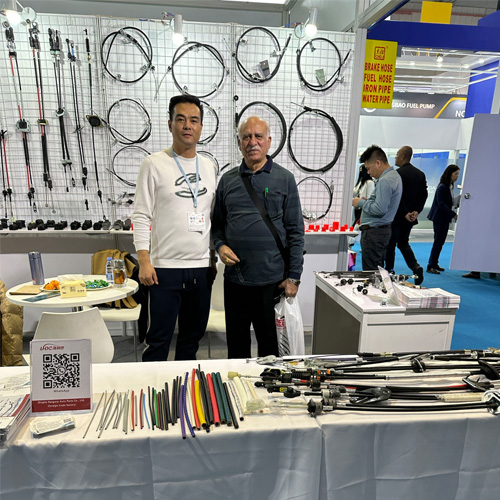clutch fluid line
Understanding Clutch Fluid Lines Importance and Maintenance
The clutch system in a vehicle is crucial for the proper functioning of manual transmission. At the heart of this system is the clutch fluid line, a component often overlooked by many vehicle owners. This article will delve into the importance of clutch fluid lines, their function, common issues, and tips for maintenance.
What is a Clutch Fluid Line?
The clutch fluid line is a hydraulic line that connects the clutch master cylinder to the clutch slave cylinder. The primary purpose of this line is to transmit hydraulic pressure generated by the clutch pedal to the slave cylinder, which then engages or disengages the clutch. The operation of the clutch is essential for changing gears smoothly, allowing drivers to accelerate and decelerate without stalling the engine.
Importance of the Clutch Fluid Line
The clutch fluid line plays a vital role in the overall performance of a vehicle's manual transmission. A properly functioning hydraulic system helps in achieving precise control over gear changes. When a driver presses the clutch pedal, hydraulic fluid flows through the clutch fluid line, allowing the driver to disengage the engine from the transmission. This seamless interaction is crucial for the vehicle’s drivability.
Moreover, the clutch fluid line is designed to withstand high pressure and temperature fluctuations while also being resistant to various environmental factors such as moisture and road chemicals. If the fluid line becomes damaged, it can lead to significant issues, including reduced performance and potential failure of the clutch system.
Common Issues with Clutch Fluid Lines
1. Leaking Fluid One of the most common problems with clutch fluid lines is leaks. Over time, the rubber or plastic materials used in the line may degrade, leading to cracks and leaks. A visible puddle of fluid or a drop in the fluid reservoir level can indicate a leak.
2. Air in the System If air enters the clutch fluid line, it can result in a spongy or unresponsive clutch pedal. Air bubbles reduce the hydraulic pressure needed for proper operation, making gear shifts difficult.
clutch fluid line

3. Blockages Contaminants or residue can sometimes block the fluid line, preventing proper fluid flow. This can cause the clutch to engage or disengage erratically.
4. Corrosion Exposure to road salt, moisture, and other harsh conditions can lead to corrosion of the metal components within the hydraulic system. Corrosion can weaken the lines and lead to failures.
Maintenance Tips
Proper maintenance of the clutch fluid line and the entire clutch system is essential to ensure smooth performance and longevity. Here are some tips
1. Regular Inspections Periodically inspect the clutch fluid line for any signs of wear, such as cracks, leaks, or corrosion. Early detection of problems can prevent more extensive damage.
2. Fluid Replacement The hydraulic fluid in the clutch system should be replaced according to the manufacturer’s recommendations. Old or contaminated fluid can lead to operational issues and may cause damage over time.
3. Bleeding the System If you notice a spongy pedal, it’s a good idea to bleed the clutch system to remove any trapped air. This can improve the responsiveness of the clutch pedal.
4. Professional Service If you’re not comfortable performing maintenance tasks, consider seeking help from a professional mechanic. They can provide comprehensive inspections and services to ensure the clutch system remains in good working condition.
Conclusion
In conclusion, the clutch fluid line is a critical component of the manual transmission system that deserves proper attention and maintenance. Understanding its function and the potential issues that can arise will help vehicle owners ensure their clutch systems operate smoothly. Regular inspections, fluid replacement, and timely professional maintenance can enhance the longevity of the clutch system, providing a safer and more enjoyable driving experience. By taking proactive measures, drivers can prevent minor issues from escalating into major repairs, ultimately saving time and money in the long run.
-
Upgrade Your Control with Premium Throttle CablesNewsAug.08,2025
-
Stay in Control with Premium Hand Brake CablesNewsAug.08,2025
-
Experience Unmatched Performance with Our Clutch HosesNewsAug.08,2025
-
Ensure Safety and Reliability with Premium Handbrake CablesNewsAug.08,2025
-
Enhance Your Vehicle with High-Performance Clutch LinesNewsAug.08,2025
-
Elevate Your Ride with Premium Gear CablesNewsAug.08,2025
